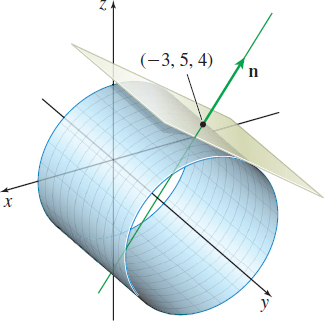EXAMPLE 7Finding a Tangent Plane and a Normal Line
A surface S is defined by x2+z2=25 and 0≤y≤10.
- (a) Find a smooth parametrization for S.
- (b) Find an equation of the tangent plane to S at the point (−3,5,4).
- (c) Find an equation of the normal line to the tangent plane at (−3,5,4).
Solution (a) Since S is a circular cylinder, we choose a parametrization that uses a variation of cylindrical coordinates. If x=rcosθ, y=y, and z=rsinθ, then x2+z2=r2=25, or equivalently, r=5. Then parametric equations for the cylinder are x=5cosθy=yz=5sinθ
and a parametrization of S is r(θ,y)=5cosθ i+yj+5sinθ k
where the parameter domain is 0≤θ≤2π and 0≤y≤10.
1023

To determine whether this is a smooth parametrization, we find the partial derivatives of r=r(θ,y). rθ(θ,y)=−5sinθ i+5cosθ kry(θ,y)=j
Each of these is continuous. Now rθ×ry=|ijk−5sinθ05cosθ010|=−5cosθ i−5sinθ k
Since ‖ then \mathbf{r}_{\theta }\times \mathbf{r}_{y}\neq \mathbf{0}. So, \mathbf{r}=\mathbf{r}( \theta ,y) \mathbf{\ } is a smooth parametrization, and S is a smooth surface.
(b) At the point ( -3,5,4) , we have 5\cos \theta =-3, y=5, and 5\sin \theta =4. Then the normal vector \mathbf{n} to the plane at ( -3,5,4) is \mathbf{r}_{\theta }\times \mathbf{r} _{y}=-5\left( -\dfrac{3}{5}\right) \mathbf{i}-5\left( \dfrac{4}{5}\right) \mathbf{k}=3\mathbf{i}-4\mathbf{k}. An equation of the tangent plane is 3( x+3) -4( z-4) =0\qquad \hbox{or equivalently}\qquad 3x-4z=-25
(c) The normal line to the tangent plane contains the point ( -3,5,4) and is parallel to 3\mathbf{i}-4\mathbf{k}. A parametrization of the normal line is \ \mathbf{r}(t) =(-3+3t) \mathbf{i}+5\mathbf{j}+( 4-4t) \mathbf{k}. See Figure 49.

